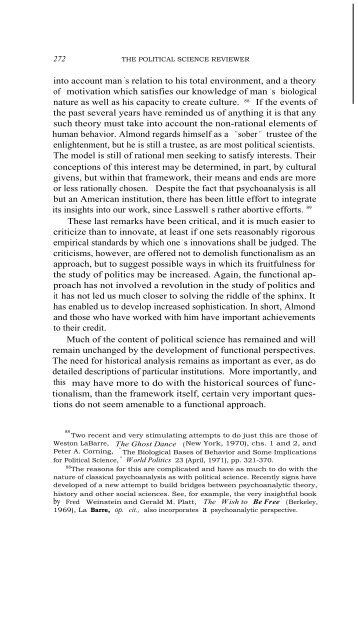FUNCTIONALISM AND ITS CRITICS - Intercollegiate Studies Institute
FUNCTIONALISM AND ITS CRITICS - Intercollegiate Studies Institute
FUNCTIONALISM AND ITS CRITICS - Intercollegiate Studies Institute
You also want an ePaper? Increase the reach of your titles
YUMPU automatically turns print PDFs into web optimized ePapers that Google loves.
272 THE POLITICAL SCIENCE REVIEWER<br />
into account man ' s relation to his total environment, and a theory<br />
of motivation which satisfies our knowledge of man ' s biological<br />
nature as well as his capacity to create culture. 88 If the events of<br />
the past several years have reminded us of anything it is that any<br />
such theory must take into account the non-rational elements of<br />
human behavior. Almond regards himself as a " sober " trustee of the<br />
enlightenment, but he is still a trustee, as are most political scientists.<br />
The model is still of rational men seeking to satisfy interests. Their<br />
conceptions of this interest may be determined, in part, by cultural<br />
givens, but within that framework, their means and ends are more<br />
or less rationally chosen. Despite the fact that psychoanalysis is all<br />
but an American institution, there has been little effort to integrate<br />
its insights into our work, since Lasswell ' s rather abortive efforts. 89<br />
These last remarks have been critical, and it is much easier to<br />
criticize than to innovate, at least if one sets reasonably rigorous<br />
empirical standards by which one ' s innovations shall be judged. The<br />
criticisms, however, are offered not to demolish functionalism as an<br />
approach, but to suggest possible ways in which its fruitfulness for<br />
the study of politics may be increased. Again, the functional approach<br />
has not involved a revolution in the study of politics and<br />
it has not led us much closer to solving the riddle of the sphinx. It<br />
has enabled us to develop increased sophistication. In short, Almond<br />
and those who have worked with him have important achievements<br />
to their credit.<br />
Much of the content of political science has remained and will<br />
remain unchanged by the development of functional perspectives.<br />
The need for historical analysis remains as important as ever, as do<br />
detailed descriptions of particular institutions. More importantly, and<br />
this may have more to do with the historical sources of functionalism,<br />
than the framework itself, certain very important questions<br />
do not seem amenable to a functional approach.<br />
88<br />
Two recent and very stimulating attempts to do just this are those of<br />
Weston LaBarre, The Ghost Dance (New York, 1970), chs. 1 and 2, and<br />
Peter A. Corning,<br />
" The Biological Bases of Behavior and Some Implications<br />
for Political Science, " World Politics 23 (April, 1971), pp. 321-370.<br />
88 The reasons for this are complicated and have as much to do with the<br />
nature of classical psychoanalysis as with political science. Recently signs have<br />
developed of a new attempt to build bridges between psychoanalytic theory,<br />
history and other social sciences. See, for example, the very insightful book<br />
by Fred Weinstein and Gerald M. Platt, The Wish to Be Free ( Berkeley,<br />
1969), La Barre, op. cit., also incorporates a psychoanalytic perspective.
















